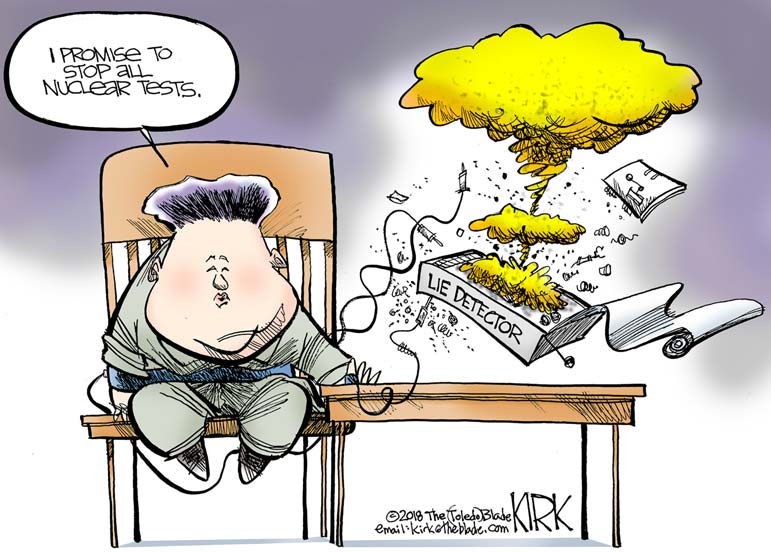
The Trump administration says that if the upcoming summit between the United States and North Korea fails or doesn't happen at all, the United States and its allies can go right back to the "maximum pressure" campaign that brought Kim Jong Un to the table in the first place. In reality, doing that would be difficult if not impossible. The pressure is already diminishing.
The administration's claim that it can immediately turn on the pressure again is crucial to its effort to play it cool ahead of the Trump-Kim summit. President Donald Trump often says that if Kim doesn't want to strike a good deal, he will simply walk away, no harm done. After the North Korean government threatened to scuttle the talks this week in response to comments from national security adviser John Bolton, the White House doubled down on this assertion.
In reality, the dynamics that made a successful maximum-pressure campaign possible have changed fundamentally. The United States and its allies have paused their efforts to increase sanctions on North Korea to give diplomacy a chance to work. The sting of the existing sanctions naturally erodes over time. There are reports that China is already easing up on its sanctions enforcement, allowing more laborers and goods to flow over North Korea's northern border. The mood in South Korea has changed significantly, making the threat of military action less credible.
"You just can't turn the maximum- pressure switch back on unless you can persuade the South Koreans and the Chinese to do that," said former State Department nonproliferation official Joseph DeThomas. "By the end of last year, time was on our side, and what Kim has done is that he's flipped us. Time is no longer on our side."
As Trump is finding out after pulling the United States out of the Iran nuclear deal, snapping back an international sanctions regime that took years of diplomacy and political will to build is not easy, especially when your partners don't see eye to eye.
The North Koreans know this perfectly well. By seeming like a constructive actor, Kim is also preparing for what happens next if talks fail. The United States will be hard-pressed to win international support for striking North Korea's nuclear program while Kim is slowly dismantling it himself. South Koreans won't want to reverse history and go back to a standoff with Pyongyang.
U.S. officials insist the United States has not given up anything and won't give real concessions until North Korea takes concrete steps toward total denuclearization. The United States and South Korea have kept joint military exercises low-key in response to North Korea's complaints, but mostly the Trump administration has held firm.
Lawmakers and experts point out that sanctions lose their value unless they're being tightened. Targets of sanctions find ways to cheat. The North Koreans make adjustments to accommodate.
There's a new bipartisan effort to actually increase sanctions on North Korea, to give the Trump administration a stronger hand in negotiations. Reps. Ted Yoho, R-Fla., and Brad Sherman, D-Calif., the heads of the Foreign Affairs subcommittee on Asia and the Pacific, wrote to Treasury Secretary Steven Mnuchin on May 9 to ask for an update on North Korea sanctions and call for more. They want to know why the Treasury Department hasn't sanctioned banks in China and elsewhere that are still doing business with Pyongyang, as U.S. law requires.
" 'Maximum pressure' will be essential to giving the President leverage in this critical negotiation, and to forcing Kim to make the difficult decision between the survival of his regime and his arsenal of nuclear weapons," they wrote. "We believe that the timely and fuller enforcement of the maximum-pressure campaign is essential."
A Treasury Department official told me that the administration is aggressively enforcing sanctions. It's also reasonable to understand why more sanctions on China could be counterproductive at this moment. But Yoho told me in an interview that the lawmakers' intention is to give the Trump administration leverage with both Pyongyang and Beijing by making Congress the bad cop.
"We get into these negotiations like we've done in the last three administrations, and things start easing up," Yoho said. "I want to keep up the pressure on anybody and everybody."
There are other things the Trump administration can do to keep pressure high now and preserve options for the future. First, it should try to keep expectations low and encourage Seoul to do the same. Also, Trump's team needs to speak with one voice to reduce confusion and deny Kim opportunities to cry foul.
Most importantly, the administration must set realistic expectations for how to reach the desired outcome, tell everybody what they are and then stick to them. That way, if Kim doesn't live up to his side of the bargain, Trump's argument for trying to return to maximum pressure will at least be stronger. At that point, the only other option could be war.
Comment by clicking here.


 Contact The Editor
Contact The Editor
 Articles By This Author
Articles By This Author